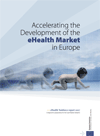 This report on lead market opportunities for eHealth proposes actions aiming at accelerating the development of the European eHealth market, increasing economic benefits and simultaneously developing the quality of health products and services. The prospective return on investment of eHealth is relatively high when compared to the costs inherent in the health sector.
This report on lead market opportunities for eHealth proposes actions aiming at accelerating the development of the European eHealth market, increasing economic benefits and simultaneously developing the quality of health products and services. The prospective return on investment of eHealth is relatively high when compared to the costs inherent in the health sector. A "lead market" can be defined as a market for innovative products and services or technological solutions with high growth potential; a market where EU industry can develop competitive advantage to lead in international markets; a market that requires action by the public authorities to deal with regulatory obstacles.
The above definition of Lead Market is the backbone of this paper, which assesses the driving factors related to the eHealth market, its potential in terms of growing demand and market growth opportunities, changing demographics and disease patterns, and healthcare capabilities in eHealth. Subsequently, the paper illustrates the eHealth markets incoherent positioning throughout Member States as well as the latent market areas. Structural barriers delaying successful market breakthrough, such as market fragmentation, lack of financial support and procurement issues, which collectively affect the development of demand for eHealth products and services, are thoroughly considered. The paper points out the positive impacts to be expected from eHealth, including strategic (competitive advantage and interoperability leading to technology advances), economic (economies of scale) and social (improvements in service level and access to health services).
Download "Accelerating the Development of the eHealth Market in Europe" Report (.pdf, 720 KB)
Download from the eHealthNews.EU Portal's mirror: "Accelerating the Development of the eHealth Market in Europe" Report (.pdf, 720 KB).
For further information:
ICT for Health
European Commission - Information society and Media DG
Office: BU31 06/73 B-1049 Brussels
Email: This email address is being protected from spambots. You need JavaScript enabled to view it.
Tel: +32 2 296 41 94
Fax: +32 2 296 01 81
http://europa.eu/information_society/eHealth